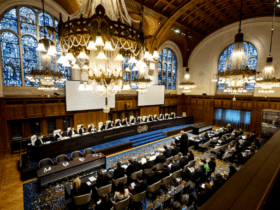In London, UK, British Prime Minister Rishi Sunak finds himself embroiled in a heated political struggle over migration policy, with many doubting his ability to emerge victorious. Recent actions on the migration front, such as a contentious proposal involving Rwanda and a new bill aimed at bypassing legal obstacles, have ignited fervent discussions within his party and throughout the UK.

Inheriting a Bold Proposal: Sunak Faces Scrutiny Over Controversial Rwanda Initiative
The Prime Minister has been handed a challenging proposal from his predecessors, which centers on the relocation of refugees to Rwanda rather than permitting them to remain in the UK. This proposal has encountered significant obstacles, primarily stemming from legal disputes, notably with the European Court of Human Rights, which has halted the deportation flights to Rwanda. Core to these disputes are human rights apprehensions, with concerns raised about the potential for refugees relocated to Rwanda to encounter heightened oppression or be repatriated to their countries of origin.
Sunak’s Controversial Bill Sparks Political Turmoil

Rishi Sunak has just revealed a controversial bill designed to eliminate legal barriers to the deportation plan for Rwanda. However, this decision has swiftly precipitated substantial political turmoil, resulting in the immigration minister’s resignation. Worries abound that Sunak’s administration could face a defeat in parliament over the bill, indicating profound rifts within the Conservative Party regarding this matter.
Financial Responsibilities and Mounting Backlash
Amidst these changes, it emerged that the British government provided an extra £100 million to Rwanda this year as a component of the agreement, supplementing a previous payment of £140 million. This financial obligation has faced increased scrutiny, particularly given the ongoing legal disputes and the lack of progress in implementing the plan.
Sunak’s Firm Position on Immigration
During a recent address in Rome, Sunak expressed concern that migrants could “overwhelm” countries, including the UK, unless drastic measures are taken. He suggested that the frameworks for asylum established after the war might need to be reevaluated. Both his choice of words and his approach have led to comparisons with the former home secretary, Suella Braverman, who was criticized for employing similarly uncompromising language. Critics have accused Sunak of engaging in a “bidding war” to deliver the most contentious remarks in the immigration discourse.
The Political and Public Response
Sunak’s emphasis on migration is perceived as a tactic to win back backing for the Conservative Party, which has been dwindling in popularity. Nevertheless, this strategy carries inherent risks. British perspectives on migration have shifted in recent years, with an increasing acknowledgment of the advantages brought by migrant labor, particularly in the health service. Following Brexit, there is a prevailing sentiment that the country now has improved control over immigration.
The Dilemma of Tough Immigration Policies
The dilemma for Sunak lies in balancing the demands of his party’s right-wing faction, which calls for tougher immigration policies, against the shifting public opinion. The Prime Minister is in a difficult position, needing to appease the hardliners within his party while not alienating the broader electorate, which seems to be softening its stance on migration.
The European Court of Human Rights and UK Sovereignty
The involvement of the European Court of Human Rights in blocking the Rwanda plan has reignited discussions about UK sovereignty and its relationship with international bodies. Some members of the Conservative Party have even suggested that the UK should consider leaving the ECHR, echoing the sentiments that fueled the Brexit movement.
Rwanda Plan: A Litmus Test for Sunak’s Leadership
The Rwanda plan and the newly introduced bill are becoming litmus tests for Sunak’s leadership and his ability to navigate complex political landscapes. With an election on the horizon, his handling of this issue could significantly impact the Conservative Party’s electoral fortunes.
Evolving Public Attitudes Towards Migration
In recent years, there has been a noticeable softening in the public’s view of migration. Many now recognize the critical role migrant labor plays in supporting sectors like the health service. Furthermore, the sense of regained control over immigration post-Brexit has altered perceptions. The challenge for Sunak is to navigate these changing attitudes while addressing the concerns of those still deeply worried about migration issues.
The Impact of Legal and International Challenges
The legal challenges to the Rwanda plan, particularly from the European Court of Human Rights, underscore the complexities of implementing stringent migration policies. These challenges not only hinder the plan’s execution but also bring into question the UK’s compliance with international human rights standards.
Internal Party Dynamics and the Migration Debate
Sunak’s stance on migration has revealed deep divisions within the Conservative Party. The right wing of the party is pushing for more stringent measures, possibly even leaving the ECHR, while others are wary of the political and ethical implications of such actions. This internal division is a crucial factor that Sunak must manage as he navigates the party’s future direction and unity.
Sunak’s Leadership Test in Upcoming Elections
With the upcoming elections, Sunak’s handling of the migration issue will be a significant factor in determining the Conservative Party’s performance. His ability to present a coherent and acceptable migration policy could be key to winning back voters who are drifting away from the party.
A Balancing Act Between Firmness and Humanity
At the core of Sunak’s challenge is finding a balance between enforcing strong immigration policies and maintaining a humane approach towards refugees and asylum seekers. His policies and rhetoric will be scrutinized for how they align with the UK’s values and international commitments.
The Global Context of Migration
Sunak’s approach to migration must also consider the broader global context, including international cooperation and the UK’s role in addressing the root causes of migration, such as conflicts and economic disparities in other parts of the world.
Conclusion
As Rishi Sunak grapples with the complex and divisive issue of migration, his decisions will have far-reaching implications not only for his leadership and the Conservative Party but also for the UK’s standing in the international community and its adherence to human rights principles. The coming months will be critical in determining the direction of UK migration policy and Sunak’s political future.




























Leave a Reply